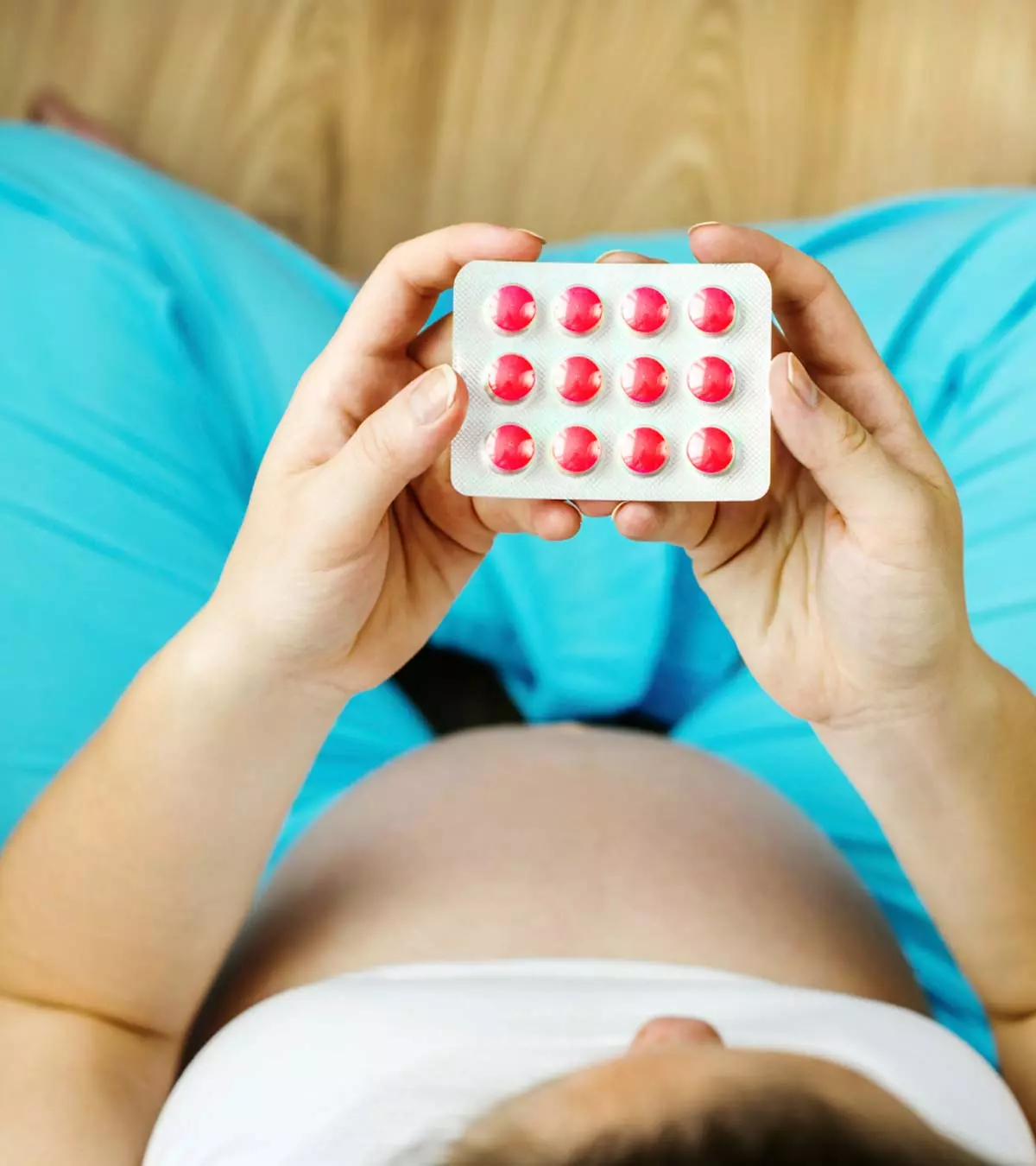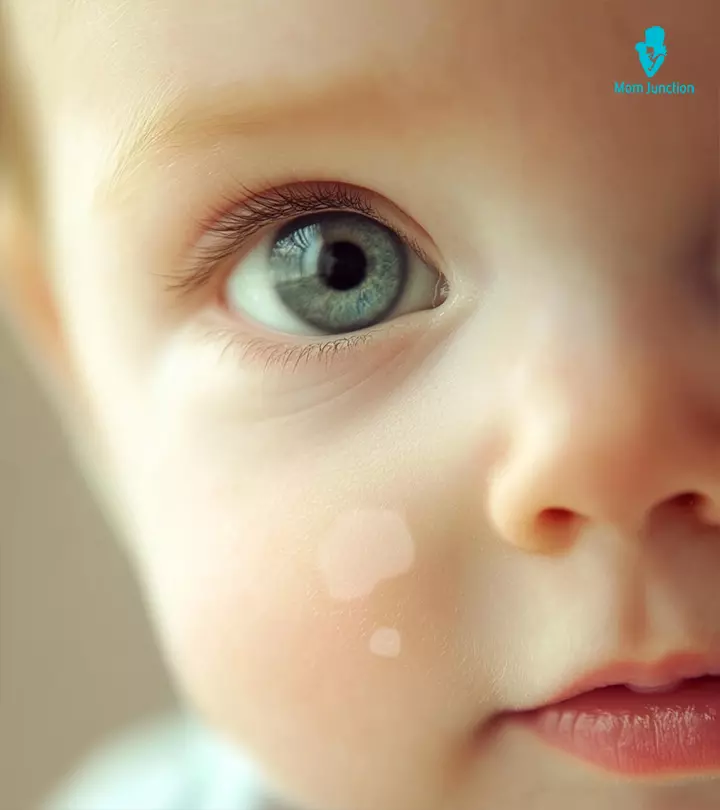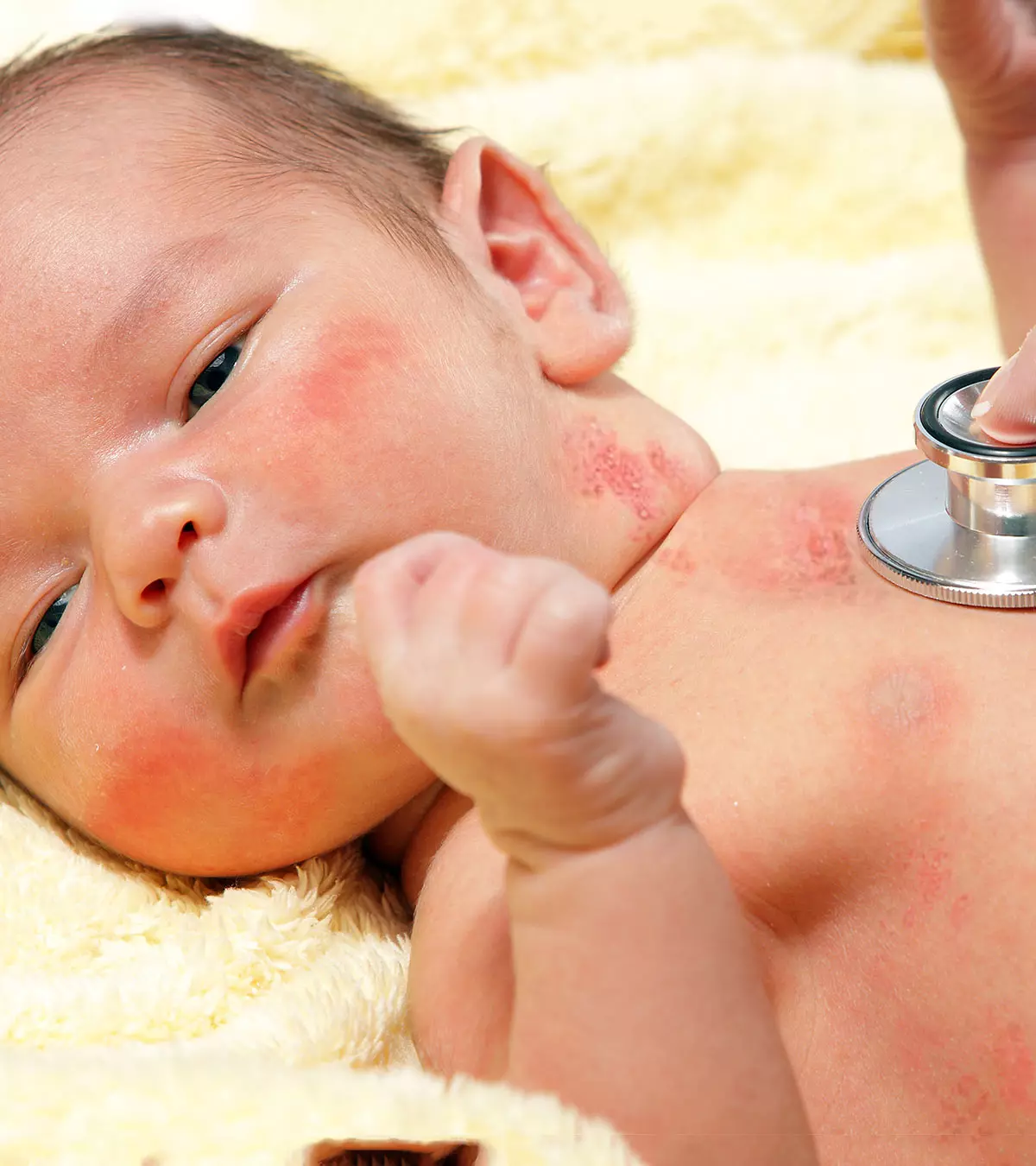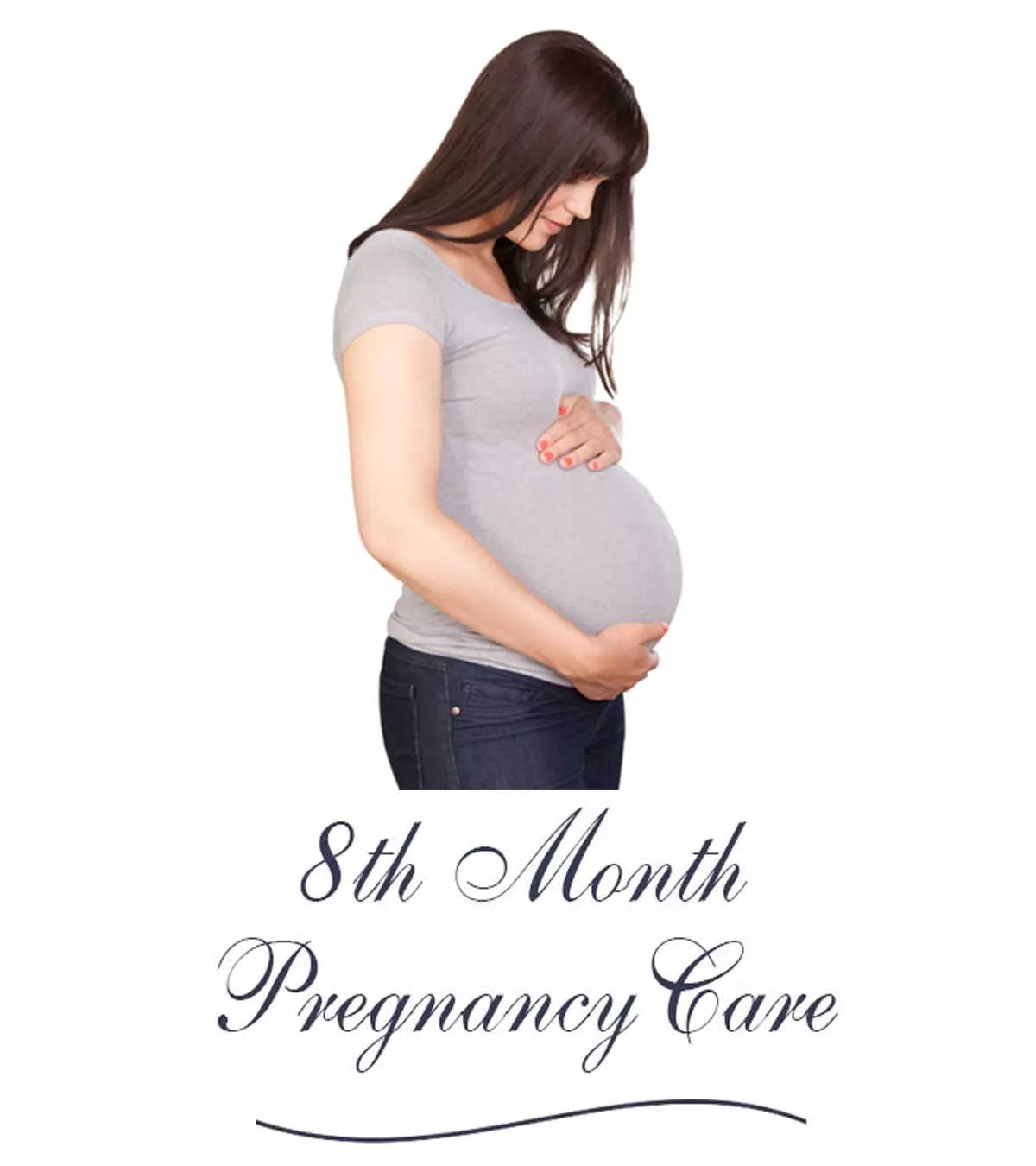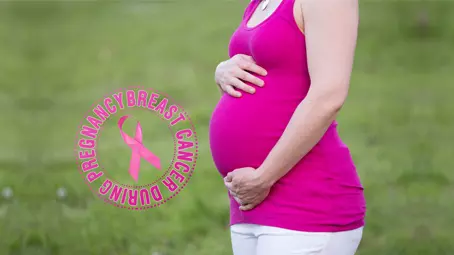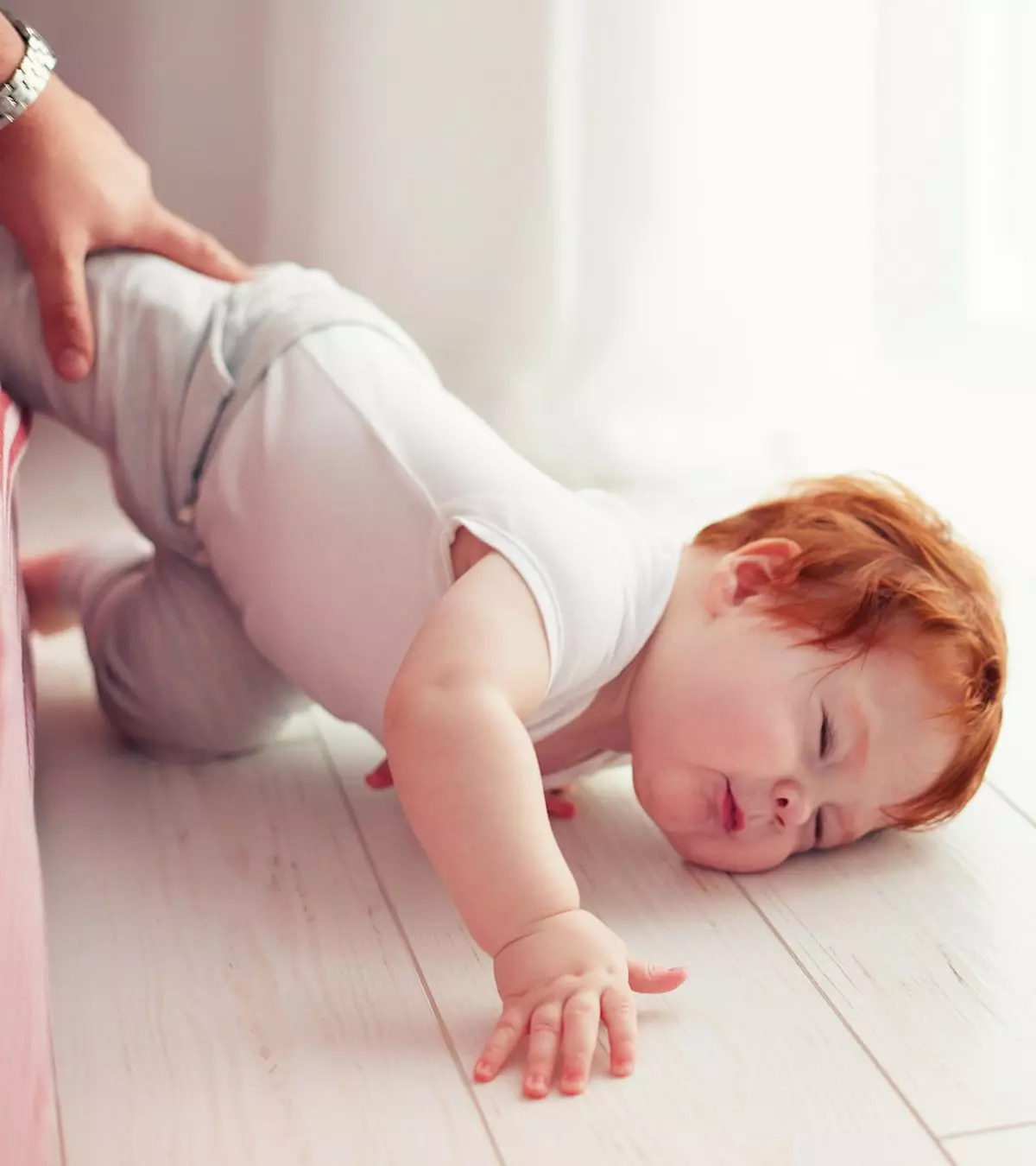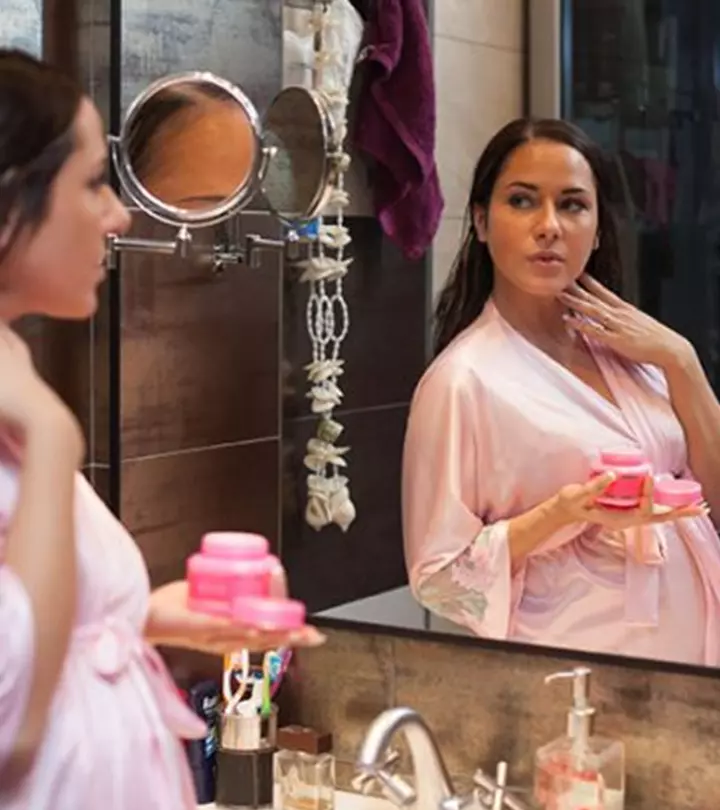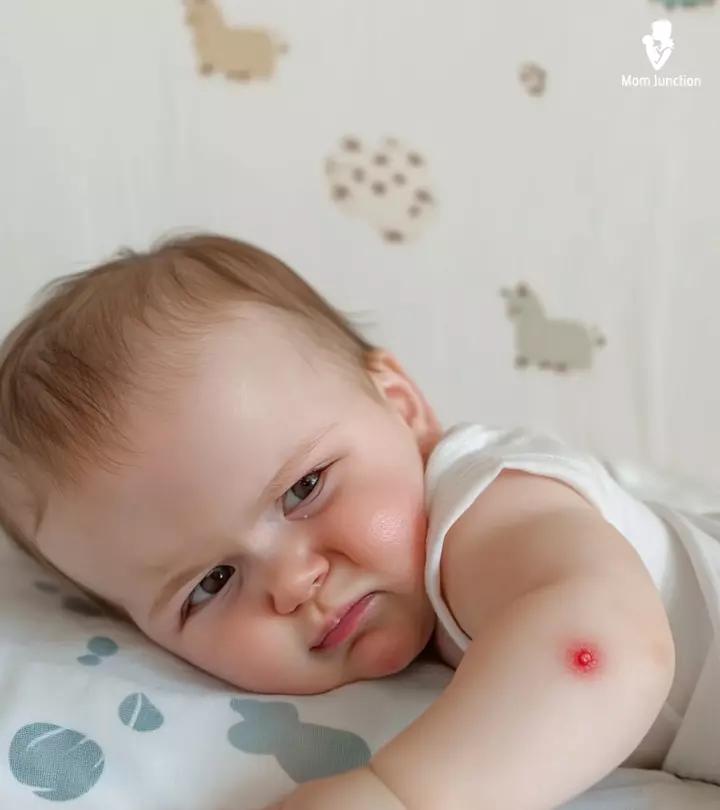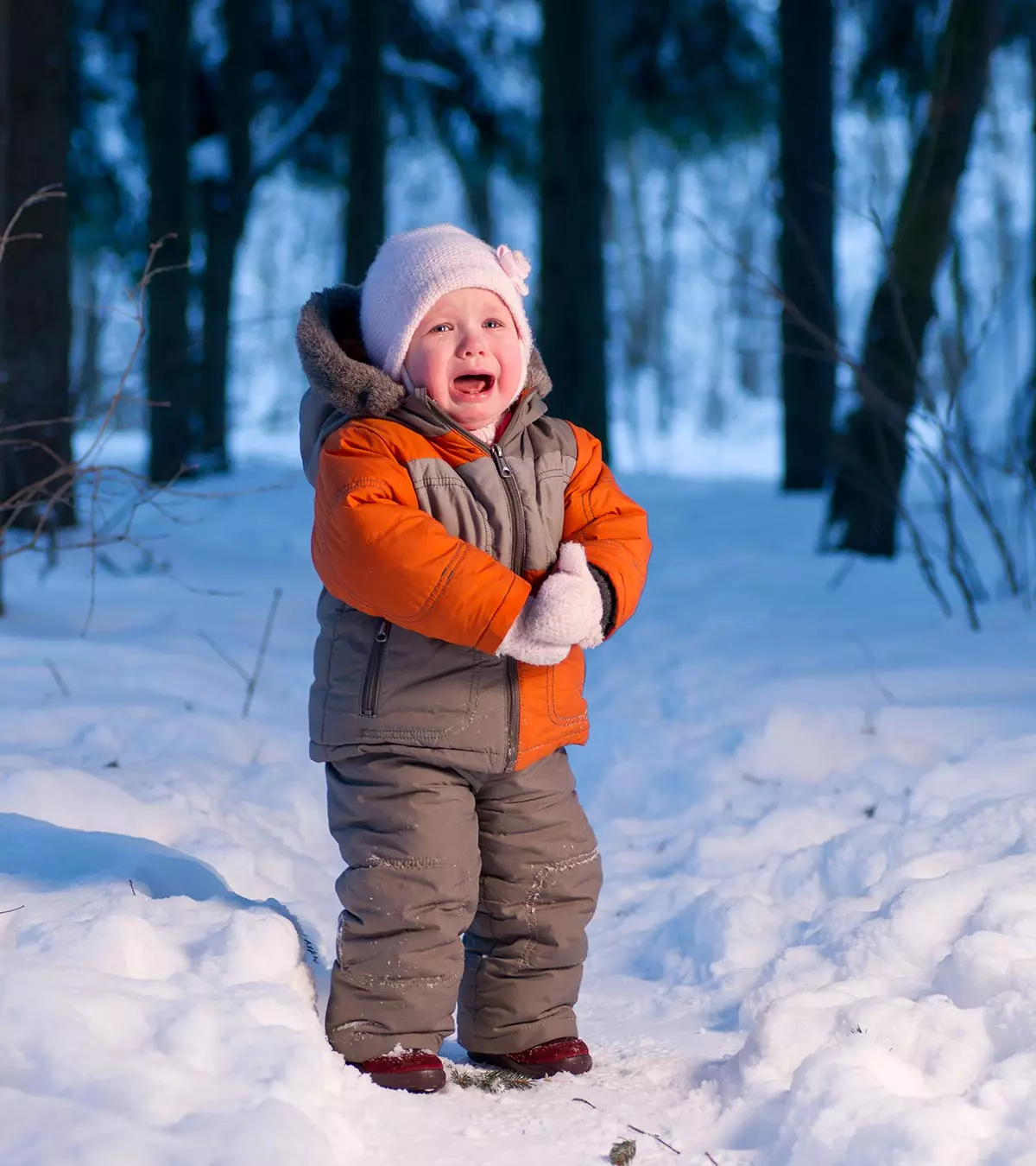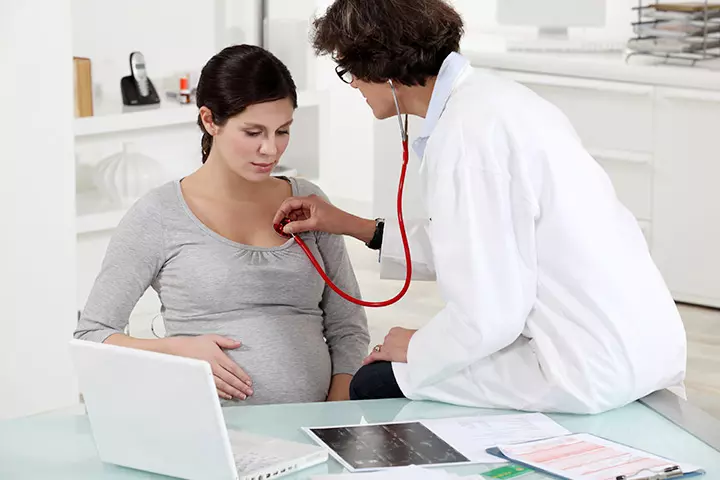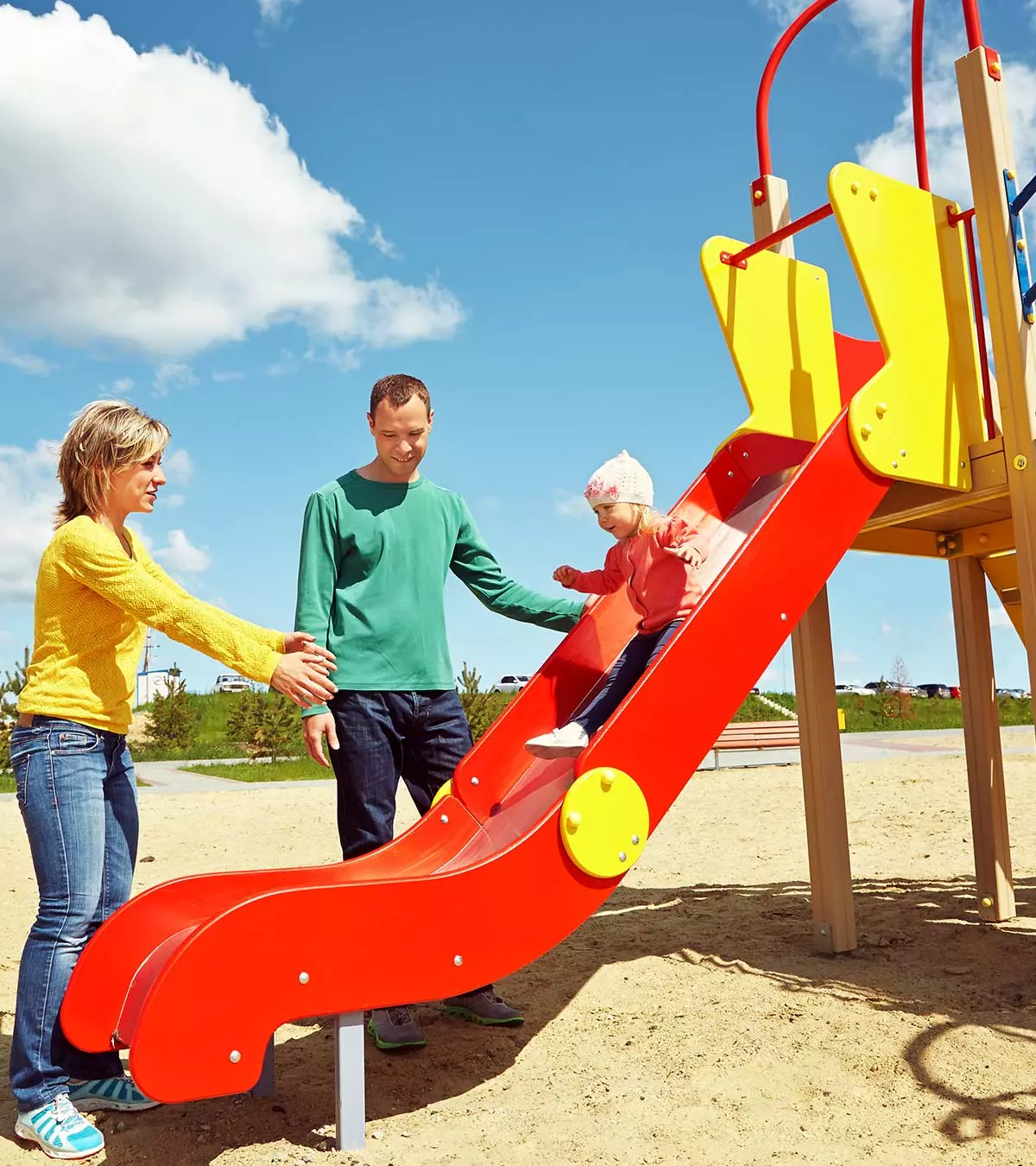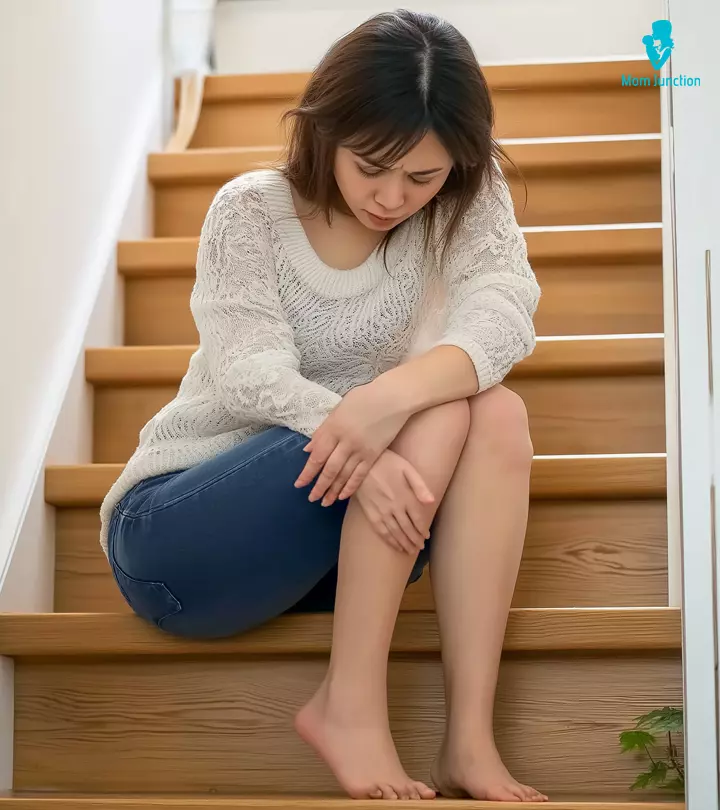
Image: Midjourney/ MomJunction Design Team
Generally, falling while pregnant may only cause minor injuries to the mother, but if the impact of the fall is severe, it can put the pregnancy at risk and could be harmful to both the mother and the baby. Falling could be more severe during the initial three months of pregnancy as this is the most sensitive time for the baby and mother, with a high risk of miscarriage. Moreover, as the delivery date approaches, if a mother experiences a fall at the end of their third trimester, it can cause premature delivery. Read this post to learn about the various reasons for falling during pregnancy and how it can be avoided in each trimester.

Key Pointers
- A fall during pregnancy can cause physical trauma to the mother, including cuts, bruises, or broken bones.
- Falling while pregnant can raise the risk of miscarriage, especially in the first trimester.
- Pregnant women who fall may experience placental abruption, which occurs when the placenta separates from the uterus.
- Falling during pregnancy could cause premature contractions, which may lead to premature labor.
What Are The Reasons For Falling During Pregnancy?
While falls are avoidable during pregnancy, there are certain factors during pregnancy that may make you lose the balance.
- Alteration in the center of gravityiImaginary point where combined mass of body appears concentrated : The growing bump makes it difficult to balance your body as the center of gravity of your body is shifting. Therefore, there may be chances of a fall (1), especially on uneven surfaces. Dr. Kimberly Langdon, MD, an Ohio-based obstetrician and gynecologist, says, “Your balance is off and so is your center of gravity. This makes it easier to fall. Try not to fall forward onto your baby bump. Try to hit your knees, sides, or hip first.”
- Pregnancy hormone relaxin: Relaxin hormone, which helps relax the joints and ligaments, may also affect your movement, gait, and walk. This hormone eventually enables the tissues of the pelvis and cervix to stretch during labor, thus making it easier for you to push the baby (2). These loose joints might make your feet unstable, making you vulnerable to fall.

- Low blood sugar and blood pressure: These conditions, which are usually common during pregnancy, may also make women feel dizzy and lose balance while walking.
- The swelling of feet might make your steps clumsy and feet a little numb. As a result, you may not feel the steps as clearly as you did before pregnancy and are prone to falling.
- Pregnancy could make you uncomfortable, exhausted, and overwhelmed, all of which may put you at the risk of a fall.
 Did you know?
Did you know?Can A Fall During Pregnancy Harm Your Baby?
Pregnant women are about two to three times more likely to fall than non-pregnant women of the same age. In fact, hospitalization due to a fall during pregnancy is the second most common cause of trauma hospitalization following motor vehicle accidents (11). However, as long as you are not severely hurt during a fall, the chances of fetal injury are very unlikely.
Mary Marnach, M.D., a gynecologist and a dermatologist at Mayo Clinic, says, “A fall during pregnancy isn’t always cause for concern. You may have little to no injury after a fall. And if you aren’t hurt, it’s not likely your developing baby is hurt either.”
It is because your fetus is well protected by (12):
- The amniotic sac and its fluid, which gives a cushioning effect inside (4)
- Thick and muscular uterus
- Abdominal muscles and fats
- Pelvic bone, especially during the early weeks of pregnancy
All the above structures, together, are likely to minimize the movement of your baby within the womb and could reduce the risks of injury due to minor accidents. If the fall is major and causes a severe maternal injury or trauma, then it is likely that your baby is also affected.
When Might A Fall Be Dangerous?
The impact of a fall could differ for both pregnant mom and baby depending on four main factors:
1. Mother’s age
The chances of obstetric complications of the fall are likely to increase with age.
For women over 35 years, the risk could be high (5). In this case, you should seek medical advice immediately, even if there are no serious symptoms.
2. Position
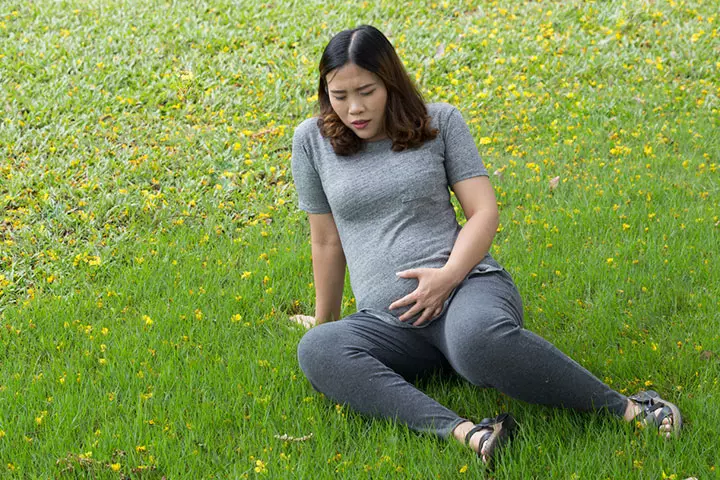
As long as you don’t fall flat on your face or hurt your stomach, you are likely to be fine. Many women fall on their back or side and don’t have any trouble, apart from the pain in that area. Support yourself with both hands in case you are falling.
3. Surface
The impact of your fall might also depend on the surface – hard or soft. However, there may be women who have fallen on concrete surfaces or slipped from stairs but may have delivered perfectly healthy babies. Slippery floors are one of the significant causes of falls in pregnant women (13).
4. Stage of pregnancy
The effect of the accident also depends on the stage of your pregnancy, during which you fell. What might be safe in the first trimester may not be so in the third. The risk factor is likely to increase in the later trimesters (11). The reason is that the baby is closer to the surface, has grown to a decent size, and is in the inverted posture, with the head down.
Falling During The First Trimester Of Pregnancy
In your early pregnancy, the uterus remains within the pelvis and is safely protected by the pelvic floor (14). Therefore, a fall might have less impact on your baby or placenta during the first trimester. If you have fallen, just lie down for some time and relax. But if you are worried or are experiencing any back or abdominal pain, seek medical care.
Falling During The Second Trimester
In the second trimester, the uterus is usually not tucked in the pelvic floor. However, there are other protection covers that shield the baby. You may face some complications in the second trimester, especially if you fall over your tummy. You should seek medical care if (12):
- You experience severe pain from the fall
- The fetal movement seems to be reduced
- There is vaginal spotting or bleeding
- You develop uterine contractions
- You feel breathless or dizzy
- You feel tenderness in the abdomen
Falling During The Third Trimester
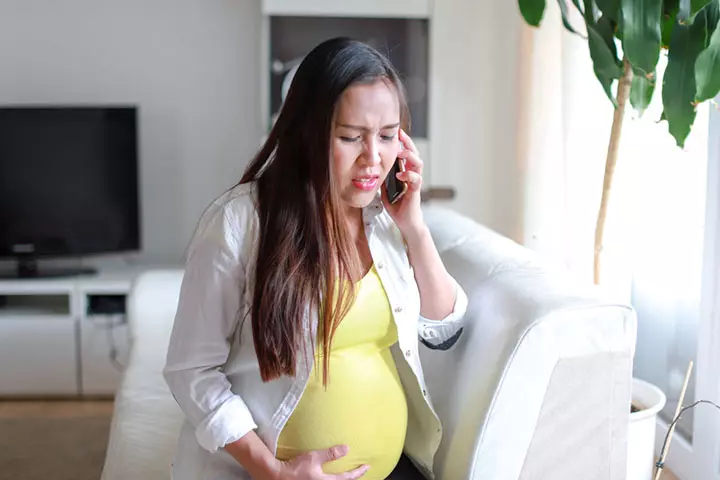
Dr. Langdon opines, “It will not hurt the baby unless you hit your bump hard, but you might injure your knees. This is because ligaments and tendons are loose during pregnancy.”
As you enter into your third trimester, the chances of hampering fetal and maternal health due to a fall could increase (6). Also, you are more likely to be vulnerable to falls during this time due to fatigue and clumsiness (15). If you have a severe fall, the damage might be more to the placenta than to any other part. It is because the abdominal trauma could increase the chance of pulling the placenta from the uterine wall.
Falls in the third trimester could lead to premature labor and other birth complications. Therefore, even if you do not have any of the above symptoms from a fall, you should still seek medical advice (10).
The warning signs that alert you to seek medical care include:
- Vaginal spotting or bleeding
- Leakage of the amniotic fluid
- Decreased fetal movements
- Feeling dizzy and fainting
- Contractions in the uterine wall
- Shortness of breath
- Abdominal pain
Rache Earlsl, a mother of four, recounts the scary incident of falling down the stairs during her third trimester. She says, “I slipped and tumbled all the way down the stairs. At that moment, I realized I needed to get to the hospital because I knew I had hit really hard. Thankfully, it was my back that took the impact, specifically the upper back and my tailbone, so I didn’t hit where the baby was.” Later, they went to the hospital, where the doctor provided comforting news that the baby was completely fine, healthy, and happy (i).
 Quick fact
Quick factTesting For Injury Due To Fall
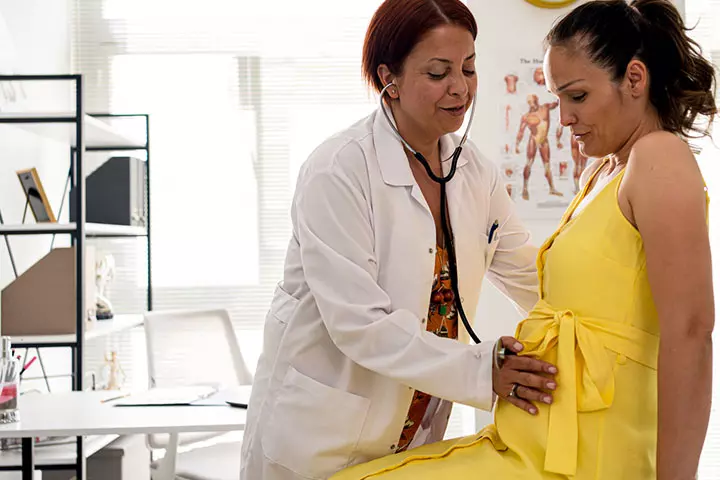
If you have a fall during pregnancy, stay calm and assess yourself first. Try to get up slowly, or ask for anyone’s help and contact a healthcare provider. Here are the steps the doctor may follow upon emergency visit (16) (17):
- Your doctor may initially check for any injuries and provide treatment. The injury may be a sprained or broken bone or chest injury, which could affect your breathing pattern.
- Then, your doctor monitors your baby by measuring the fetal heart tones with the help of an ultrasound or Doppler. They may ask you for certain signs such as uterine bleeding, tenderness, and contractions.
- Continuous electronic fetal monitoring may help your doctor determine if you could have any complications, such as placental abruption or abnormal heart rate.
- Blood testing might be recommended to check the blood type and platelet count. It is because pregnant women who are Rh-negativeiWhen blood cells do not have Rh factor protein are at higher risk of developing internal bleeding that may affect their fetus. Doctors also recommend an Rho-GAM shot to prevent any problems related to blood type incompatibility.
Can You Prevent Yourself From Falling And Slipping?
You cannot always prevent falling. However, if proper precautions are taken, you could minimize the risk.
- Lean on something strong for support or sit down if you are feeling dizzy.
- Wear footwear with non-skid soles and proper grip. You may use wedge-heeled or low-heeled shoes so that your body does not pitch forward (17). If you are considering wearing heels during pregnancy, it’s best to avoid high heels or completely flat shoes, as they can put extra strain on your lower back and calf muscles.
- Watch ahead while you are footing. Be careful while stepping on uneven or and wet surfaces. Walk on leveled surfaces and avoid grassy areas.
- You should hold onto the handrails while using a staircase. If you cannot hold on to anything, ask somebody to lend their hand for support while climbing stairs during pregnancy.
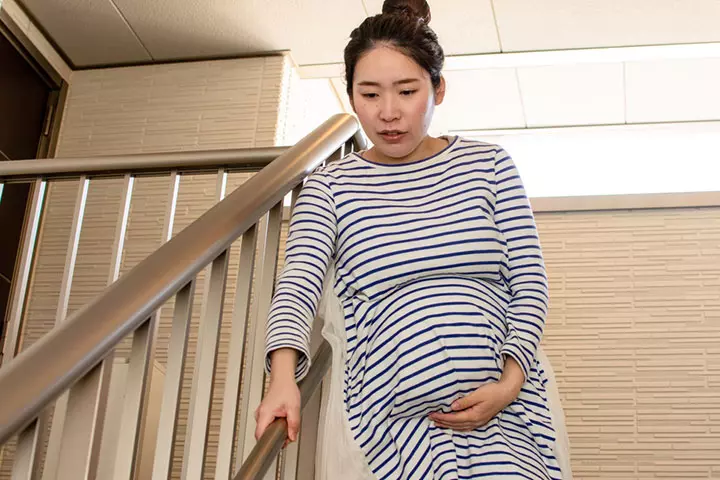
- Do not carry heavy loads as they keep your attention away from your feet while walking.
- Wet areas such as the bathroom and kitchen are prone to be accident areas. Water and soap can together make the surface slippery. You may use anti-skid tape or non-skid mats in your bathroom to avoid the risks of falls.
- When you use the toilets, especially at night, ensure that the area is well-lit.
- Install brightly lit light bulbs around the house, including rooms, passages, and staircases; avoid walking in the darkness (17).
- Mop the spillages immediately and remove any clutters, trailing wires, and frayed carpet around the house.
- Avoid wearing trailing clothes that may cause trips and falls.
- Trim your toenails regularly to avoid accidental bumping of toenails and causing trauma.
- Pregnant women are more prone to obstetric falls in hospitals due to various factors such as bodily changes, medical conditions, and unsteady hospital settings. Therefore, expectant mothers must follow necessary safety precautions to prevent falls while in a hospital.
Balance Exercises During Pregnancy
Practicing some pregnancy-safe balance exercises can help you maintain postural stability and good neuromuscular control. You may also consider consulting a physical therapist for personalized exercises tailored to your needs. Here are some balance exercises you may try (8).
- Balancing on one leg: With the support of a nearby chair, stool, or any stable object, stand on a single leg for a few minutes. This exercise will help you feel your body weight centered over your ankles; thus, giving you a sense of balance.
- Marching in one place: Instead of moving, march in one place while taking support when standing. Lift your knees one at a time to shift your balance from one leg to the other.
- Moving sideways: Move sideways by taking steps to the side. This will help to improve your lateral stability.
- Pilates and prenatal yoga: Enrolling yourself in yoga and Pilates classes is also beneficial for improving posture and balance and stabilizing core muscles.
 Quick tip
Quick tipFrequently Asked Questions
1. Can a hard fall cause a miscarriage?
Minor injuries may not lead to miscarriage as the baby is well-protected in the uterus. However, a major injury may lead to miscarriage (9). It depends on various factors such as the stage of pregnancy, the impact of a fall on which body part, and the position of the baby.
2. Can a fall during pregnancy hurt the baby?
The thick uterine walls, strong abdominal muscles, cushioning from amniotic fluid, and the pelvic bone helps protect the baby during pregnancy from a fall, especially in the first trimester. However, direct trauma to the abdomen during the second and third trimesters can be harmful to both the mother and the baby (7).
3. Can a fall during pregnancy induce labor?
A woman who undergoes a trauma may feel pain similar to labor contractions, but these contractions may not be actual contractions. However, if contractions are actually present, the probability of placental abruption, uterine rupture, or hemorrhage must be looked into. HypoxiaiLow level of oxygen in body’s tissues and hypovolemiaiLow level of blood or fluid in the body resulting from these conditions may lead to preterm labor, requiring immediate cesarean delivery (10).
4. Can a fall during pregnancy cause placental abruption?
Placental abruption may occur in 1-5% of all cases of minor trauma (10).
5. How can pregnant women recover if they fall?
After a minor fall, try to get support from a family member or friend and walk to see if you are feeling any pain. It is also a good idea to speak with your doctor about the fall and any symptoms you may be experiencing.
The many physiological changes of the body may increase your chances of falling while pregnant. While a few falls can be harmless based on the position and intensity, others may be fatal. Nevertheless, it would help to remain cautious and aware of your body’s changes. Avoid accident-prone areas in your house, and do not hesitate to ask for support while performing a task. Check with your doctor if you’ve been experiencing dizziness or numbness in your feet lately. If you have fallen, inspect yourself for any injuries and visit a doctor for a checkup.
Infographic: How To Prevent Yourself From Falling And Slipping During Pregnancy?
You need to take extra care of yourself during pregnancy to ensure the safety of your baby and yourself. As the pregnancy progresses, there is a sufficient increase in the risk of falling or slipping. Thus, we suggest you read the following infographic for preventive measures to avoid mishaps. Illustration: Momjunction Design Team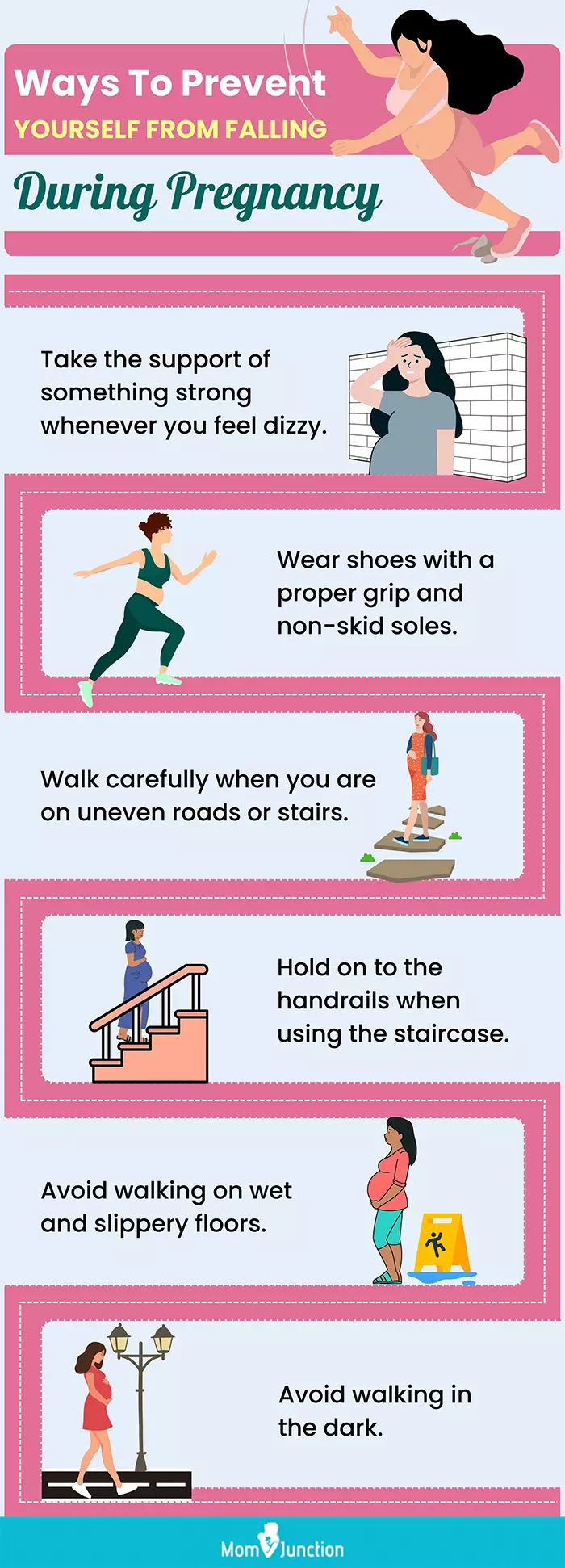
Illustration: Falling During Pregnancy: Is There A Reason To Panic?

Image: Dall·E/MomJunction Design Team
Personal Experience: Source
MomJunction articles include first-hand experiences to provide you with better insights through real-life narratives. Here are the sources of personal accounts referenced in this article.
i. I fell down the stairs at 38 weeks pregnant! Hospital visit;https://www.youtube.com/watch?v=AqfcEZBr_Rk&feature=youtu.be
References
1. Cakmak B et al.; Postural balance and the risk of falling during pregnancy; J Matern Fetal Neonatal Med (2016)
2. Laura T. Goldsmith and Gerson Weiss; Relaxin in Human Pregnancy; Ann N Y Acad Sci (2013)
3. Ivana Hrvatin and Darja Rugelj; Risk factors for accidental falls during pregnancy – a systematic literature review; The Journal of Maternal-Fetal & Neonatal Medicine (2025).
4. Pregnancy and Childbirth: Premature Rupture of the Membranes (PROM); UC San Diego (2016)
5. Reeta Lampinen et al.; A Review of Pregnancy in Women Over 35 Years of Age; Open Nurs J. (2009)
6. Inanir A et al.; Evaluation of postural equilibrium and fall risk during pregnancy; Gait Posture (2014)
7. Falling during pregnancy: Reason to worry?; Beacon Health System
8. Preventing a Fall During Pregnancy: Strength and Balance Exercises; Dignity Health
9. What is a Miscarriage?; Planned Parenthood
10. Diann M. Krywko et al.; Pregnancy Trauma; National Center for Biotechnology Information
11. Paula Drabiščáková et al.; The Incidence and Risk Factors of Falls During Pregnancy; CEOG (2025)
12. Pregnancy week by week; Mayo Clinic
13. Ivana Hrvatin and Darja Rugelj; Risk factors for accidental falls during pregnancy – a systematic literature review; THE JOURNAL OF MATERNAL-FETAL & NEONATAL MEDICINE (2025)
14. Falling during pregnancy: Reason to worry?; Koç University Hospital
15. Am I Normal: My Pregnancy is Making Me Clumsy; University of Utah Health
16. Venu Jain et al.; Guidelines for the Management of a Pregnant Trauma Patient; SOGC (2015)17. Prevention-Falls; NHS
Community Experiences
Join the conversation and become a part of our nurturing community! Share your stories, experiences, and insights to connect with fellow parents.
Read full bio of Dr. Sangeeta Agrawal
- Dr. Kimberly Langdon is a gynecologist with 19 years of experience wherein she delivered more than 2,000 babies. She is currently working as vice-president, product development and research at Physician Integrative Laboratories in the US. She did her doctor of medicine from the Ohio State University.
 Dr. Kimberly Langdon is a gynecologist with 19 years of experience wherein she delivered more than 2,000 babies. She is currently working as vice-president, product development and research at Physician Integrative Laboratories in the US. She did her doctor of medicine from the Ohio State University.
Dr. Kimberly Langdon is a gynecologist with 19 years of experience wherein she delivered more than 2,000 babies. She is currently working as vice-president, product development and research at Physician Integrative Laboratories in the US. She did her doctor of medicine from the Ohio State University.
Read full bio of Rebecca Malachi
Read full bio of Swati Patwal
Read full bio of Aneesha Amonz






